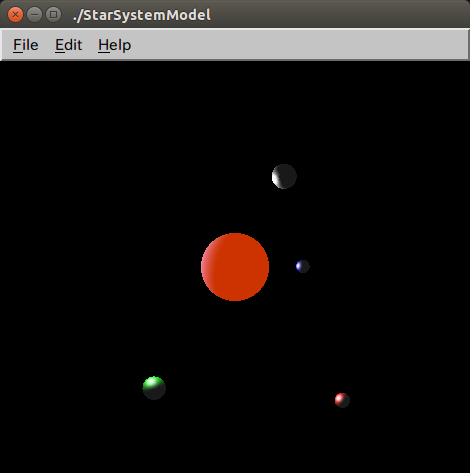//
//StarSystemModel.cpp
//Copyright (c) 2017 Antillia.com TOSHIYUKI ARAI. ALL RIGHTS RESERVED.
#include <oz++/Mutex.h>
#include <oz++/motif/RenderingTimer.h>
#include <oz++/opengl/OpenGLMainView.h>
#include <oz++/opengl/OpenGLView.h>
#include <oz++/opengl/OpenGLGC.h>
#include <oz++/opengl/OpenGLLight.h>
#include <oz++/opengl/OpenGLMaterial.h>
#include <oz++/opengl/OpenGLSolidSphere.h>
//#include <oz++/opengl/OpenGLSphere.h>
#include <oz++/opengl/OpenGLCircle.h>
namespace OZ {
class MainView :public OpenGLMainView {
private:
static const int NUMBER_OF_PLANETS = 4;
private:
//Inner class starts
class SimpleView: public OpenGLView {
private:
OpenGLGC gc;
SmartPtr<OpenGLSolidSphere> sun;
SmartPtr<OpenGLSolidSphere> planets[NUMBER_OF_PLANETS];
SmartPtr<OpenGLCircle> orbits[NUMBER_OF_PLANETS];
float angles[NUMBER_OF_PLANETS];
SmartPtr<RenderingTimer> timerThread;
int renderingInterval;
float angle;
static const int CIRCLE_ANGLE = 360;
static const int INCREMENT = 1;
Mutex mutex;
public:
virtual void display()
{
mutex.lock();
if (angle <(CIRCLE_ANGLE - INCREMENT) ) {
angle += INCREMENT;
} else {
angle = INCREMENT;
}
static const float INCREMENT[NUMBER_OF_PLANETS] = { 1.0f, 0.7f, 0.5f, 0.2f };
for (int i = 0; i < NUMBER_OF_PLANETS; i++) {
if (angles[i] < CIRCLE_ANGLE - INCREMENT[i]) {
angles[i] += INCREMENT[i];
}
else {
angles[i] = INCREMENT[i];
}
}
if (sun) {
setPerspective();
gc.clear(GL_COLOR_BUFFER_BIT | GL_DEPTH_BUFFER_BIT);
gc.loadIdentity();
gc.lookAt(-1.0, 10.0, 19.0, 0.0, 0.0, 0.0, 0.0, 1.0, 0.0);
gc.clearColor(0.0, 0.0, 0.0, 1.0);
gc.enable(GL_CULL_FACE);
gc.enable(GL_LIGHTING);
gc.color(1.0f, 1.0f, 1.0f);
sun-> draw(&gc, 0.0f, 0.0f, 0.0f);
OpenGLLight light(GL_LIGHT0);
GLfloat lightPosition[] = {-2.0f, 0.0f, -1.0f, 1.0};
light.position(lightPosition);
for (int i = 0; i<NUMBER_OF_PLANETS; i++) {
Vertex3 pos = orbits[i]->getOrbitPosition(angles[i]);
planets[i]-> draw(&gc, pos.x, pos.y, pos.z);
}
}
mutex.unlock();
}
virtual void resize(int w, int h)
{
if (w == 0 || h == 0) {
return;
}
setPerspective();
}
virtual void initialize()
{
Color4 black = { 0.0, 0.0, 0.0, 1.0 };
Color4 ambient = { 0.5, 0.5, 0.5, 1.0 };
Color4 diffuse = { 0.2, 0.4, 0.8, 1.0 };
Color4 greendiffuse = { 0.0, 1.0, 0.0, 1.0 };
Color4 reddiffuse = { 1.0, 0.0, 0.0, 1.0 };
Color4 bluediffuse = { 0.0, 0.0, 1.0, 1.0 };
Color4 silverdiffuse = { 0.8, 0.8, 0.8, 1.0 };
Color4 specular = { 1.0, 1.0, 1.0, 1.0 };
Color4 emission = { 0.8, 0.2, 0.0, 0.0 };
GLfloat lowShining = { 10.0 };
GLfloat highShining = {100.0 };
OpenGLMateria sunMateria(GL_FRONT, black, diffuse, black, emission, highShining);
sun = new OpenGLSolidSphere(sunMateria, 0.5f, 40, 40);
int index = 0;
orbits[index++] = new OpenGLCircle(0.0f, 0.0f, 0.0f, 1.0);
orbits[index++] = new OpenGLCircle(0.0f, 0.0f, 0.0f, 1.6f);
orbits[index++] = new OpenGLCircle(0.0f, 0.0f, 0.0f, 2.4f);
orbits[index] = new OpenGLCircle(0.0f, 0.0f, 0.0f, 2.9f);
OpenGLMateria planetMateria1(GL_FRONT, ambient, bluediffuse, specular, black, lowShining);
OpenGLMateria planetMateria2(GL_FRONT, ambient, silverdiffuse, specular, black, lowShining);
OpenGLMateria planetMateria3(GL_FRONT, ambient, greendiffuse, specular, black, lowShining);
OpenGLMateria planetMateria4(GL_FRONT, ambient, reddiffuse, specular, black, lowShining);
index = 0;
planets[index++] = new OpenGLSolidSphere(planetMateria1, 0.10f, 20, 20);
planets[index++] = new OpenGLSolidSphere(planetMateria2, 0.18f, 20, 20);
planets[index++] = new OpenGLSolidSphere(planetMateria3, 0.18f, 20, 20);
planets[index] = new OpenGLSolidSphere(planetMateria4, 0.12f, 20, 20);
timerThread = new RenderingTimer(this, renderingInterval);
timerThread->start();
}
public:
SimpleView(OpenGLMainView* parent, const char* name, Args& args)
:OpenGLView(parent, name, args),
renderingInterval(10)
{
for (int i = 0; i < NUMBER_OF_PLANETS; i++) {
angles[i] = 30.0f * i;
}
renderingInterval = (const int)args.get(XmNrenderingInterval);
}
~SimpleView()
{
}
};
//Inner class ends
private:
SmartPtr<SimpleView> view;
public:
MainView(OpenGLApplication& applet, const char* name, Args& args)
:OpenGLMainView(applet, name, args)
{
int interval = args.get(XmNrenderingInterval);
Args ar;
ar.set(XmNrenderingInterval, interval); //20 millisec
view = new SimpleView(this, "", ar);
}
~MainView()
{
}
};
}
//
int main(int argc, char** argv)
{
try {
XInitThreads();
glutInit(&argc, argv);
const char* name = argv[0];
OpenGLApplication applet(name, argc, argv);
Args args;
args.set(XmNwidth, 400);
args.set(XmNheight, 400);
args.set(XmNrenderingInterval, 20); //20 millisec
MainView view(applet, name, args);
view.realize();
applet.run();
} catch (Exception& ex) {
caught(ex);
}
return 0;
}
|
